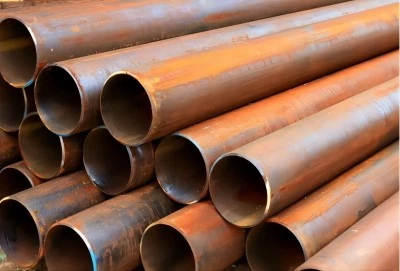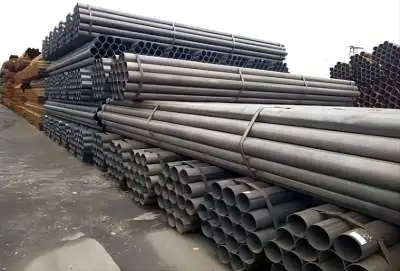API 5L ERW (Electric Resistance Welded) pipes represent a cornerstone technology in modern oil and gas transportation infrastructure. These specialized pipes, manufactured according to the American Petroleum Institute's stringent 5L specification, have revolutionized the way hydrocarbons are transported across vast distances. The combination of superior strength, reliability, and cost-effectiveness has made API 5L ERW pipes indispensable in various applications throughout the oil and gas industry. The innovative manufacturing process, coupled with rigorous quality control measures, ensures these pipes meet the demanding requirements of modern energy transportation systems. Their widespread adoption across the industry testifies to their exceptional performance characteristics and reliability in critical applications. This comprehensive exploration delves into the diverse applications and critical roles these pipes play in ensuring efficient and safe energy transportation.
|
|
|
Pipeline Transportation
API 5L ERW pipes form the backbone of pipeline transportation systems in the oil and gas sector. These pipes demonstrate exceptional versatility in handling various products, including crude oil, refined petroleum products, natural gas, and production water.
The manufacturing process of ERW pipes, which involves high-frequency electric resistance welding, creates a strong and uniform seam that can withstand the demanding conditions of long-distance transportation. The precision-controlled welding process ensures consistent joint quality throughout the pipe length, minimizing the risk of failures and maintaining structural integrity under various operating conditions.
The pipes' mechanical properties, including yield strength, tensile strength, and impact toughness, are carefully controlled during production to meet the specific requirements of different transportation scenarios. Grades ranging from A25 to X80 provide operators with options to match their specific operational needs, pressure requirements, and environmental conditions. Each grade offers unique combinations of strength and ductility, allowing engineers to optimize pipeline design for specific service conditions while maintaining safety margins and operational efficiency.
Modern pipeline networks utilizing API 5L ERW pipes incorporate advanced monitoring systems and protective coatings. These pipes typically feature external coatings such as fusion-bonded epoxy (FBE) or three-layer polyethylene to prevent corrosion and extend service life. Internal coatings may also be applied to reduce friction and enhance flow efficiency, particularly in natural gas transportation. The coating systems undergo rigorous testing and qualification processes to ensure long-term performance and compatibility with various operating environments.
The implementation of API 5L ERW pipes in pipeline systems requires comprehensive engineering analysis, considering factors such as soil conditions, environmental impacts, and operational parameters. Advanced computer modeling and simulation techniques help optimize pipeline routing and design, ensuring safe and efficient operation throughout the system's lifecycle. Regular inspection and maintenance programs, including intelligent pigging operations, help maintain the integrity of these critical transportation arteries.
Sour Gas Service
The transportation of sour gas, which contains significant amounts of hydrogen sulfide (H₂S), presents unique challenges that API 5L ERW pipes are specifically engineered to address. These pipes undergo rigorous testing and certification processes to ensure their suitability for sour service conditions. The NACE MR0175/ISO 15156 standard governs the materials selection and qualification for such applications, establishing strict requirements for chemical composition, mechanical properties, and manufacturing processes.
API 5L ERW pipes designated for sour service feature carefully controlled chemical composition, particularly regarding carbon, manganese, phosphorus, and sulfur content. The steel used in these pipes undergoes specialized heat treatment processes to achieve optimal microstructure and resistance to hydrogen-induced cracking (HIC) and sulfide stress cracking (SSC). The metallurgical design focuses on creating a uniform, fine-grained structure that minimizes susceptibility to environmental cracking while maintaining required strength levels. The manufacturing process includes precise control of hardness in the base metal and heat-affected zone (HAZ) to ensure compliance with sour service requirements.
Regular quality control testing, including HIC testing and SSC testing, validates the pipes' ability to maintain structural integrity under prolonged exposure to H₂S-containing environments. The welding process parameters are carefully monitored and controlled to ensure the weld seam exhibits similar resistance to environmental cracking as the base material. Advanced inspection techniques, including ultrasonic testing and magnetic particle inspection, are employed throughout the manufacturing process to detect any potential defects that could compromise performance in sour service conditions. The pipes undergo comprehensive documentation and traceability procedures, ensuring that material properties and manufacturing parameters can be verified throughout their service life. Regular monitoring and inspection programs during operation help maintain the safety and reliability of sour service pipeline systems.
Enhanced Oil and Gas Recovery (EOR)
In the realm of Enhanced Oil and Gas Recovery operations, API 5L ERW pipes play a crucial role in maximizing reservoir productivity. These pipes facilitate various EOR techniques, including water injection, steam flooding, and gas injection, which are essential for maintaining reservoir pressure and improving hydrocarbon recovery rates. The diverse range of EOR applications requires careful consideration of material selection and design parameters to ensure long-term reliability and operational efficiency.
Water injection systems utilizing API 5L ERW pipes require specific considerations regarding internal corrosion protection and pressure ratings. The pipes used in these applications often incorporate specialized linings or enhanced metallurgy to withstand the corrosive effects of injection water and maintain long-term reliability. Careful attention is paid to flow patterns and velocity distributions to minimize erosion-corrosion effects and optimize system performance. The design of water injection systems includes comprehensive analysis of water chemistry, injection pressures, and temperature profiles to ensure appropriate material selection and corrosion mitigation strategies. Steam flooding applications present particularly demanding conditions, with high temperatures and thermal cycling.
API 5L ERW pipes used in these scenarios must maintain their mechanical properties at elevated temperatures while accommodating thermal expansion and contraction. The pipes' welded seams undergo additional inspection and testing to ensure their integrity under these challenging conditions. Specialized design considerations include thermal insulation systems, expansion loops, and anchoring arrangements to manage thermal stresses effectively. Gas injection systems, whether utilizing natural gas, carbon dioxide, or nitrogen, rely on API 5L ERW pipes to maintain system integrity under varying pressure conditions. These pipes must resist both internal and external corrosion while handling the specific challenges posed by different injection gases, including the potential for rapid gas decompression. The design of gas injection systems incorporates sophisticated flow modeling to optimize injection patterns and prevent operational issues such as flow-induced vibration and pressure cycling fatigue.
Advanced monitoring systems, including distributed temperature and pressure sensing, help operators optimize EOR operations and maintain system integrity. Regular inspection programs, including corrosion monitoring and mechanical integrity assessments, ensure the continued safe operation of EOR pipeline systems. The implementation of risk-based inspection strategies helps focus resources on critical areas while maintaining overall system reliability.
API 5L ERW Pipe For Sale
LONGMA GROUP has established itself as a leading API 5L ERW pipes supplier, offering a comprehensive range of products that meet both PSL1 and PSL2 specifications. Their manufacturing capabilities extend to LSAW (Longitudinal Submerged Arc Welded) steel pipes, providing customers with diverse options for various applications.
The company's commitment to quality excellence is demonstrated through its state-of-the-art manufacturing facilities and rigorous quality control procedures. The product range includes pipes manufactured to multiple API 5L grades, with sizes and wall thicknesses tailored to specific project requirements. Each pipe undergoes rigorous quality control procedures, including non-destructive testing and mechanical property verification, to ensure compliance with applicable standards and customer specifications. Advanced testing equipment and qualified personnel ensure consistent product quality and reliability.
Customers seeking reliable API 5L ERW pipe solutions can contact LONGMA GROUP directly at info@longma-group.com for detailed product information, technical support, and quotations. The company's commitment to quality and customer service has established its reputation in the global oil and gas industry. Technical experts are available to assist customers with material selection and specification development, ensuring optimal product selection for specific applications.
LONGMA GROUP maintains extensive inventory levels and efficient logistics systems to meet customer delivery requirements. The company's global presence and established distribution networks enable timely delivery to project locations worldwide. Comprehensive documentation packages, including material certificates and testing reports, accompany each shipment to facilitate customer quality verification and project documentation requirements.














